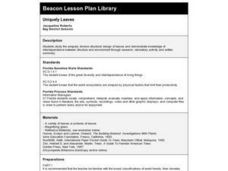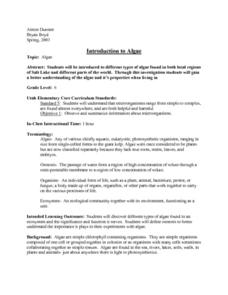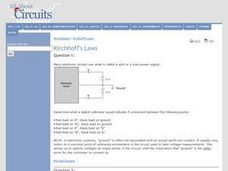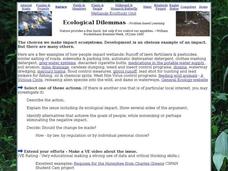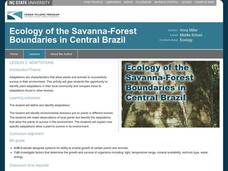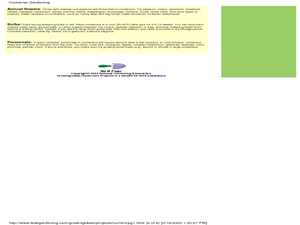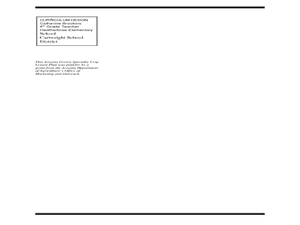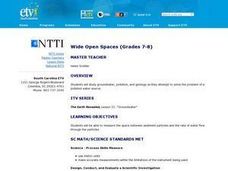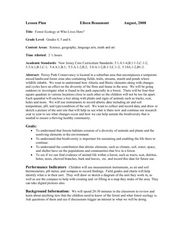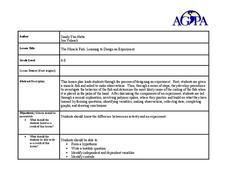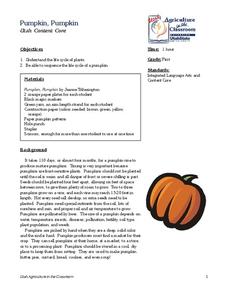Curated OER
A Study of Erosion on the Weller School Playground
Students study an erosion problem which existed on the school playground from as many points of view as possible. The ultimate aim is to suggest and encourage implementation of a plan to prevent further damage to the playground.
Curated OER
Uniquely Leaves
Fourth graders study the uniquely diverse structural design of leaves and demonstrate knowledge of interdependence between structure and environment through research, laboratory activity and written summary.
Curated OER
Examining a Hazardous Waste Site
Students identify activities that produce hazardous waste. They examine how contaminants are spread in air and water. They work together to create a model to show how the contaminants move through water.
Curated OER
Termite Trail Marking Behavior
Students examine termites and their trail-marking behaviors. They draw lines on paper with various ink pens and experiment to see which types of ink the termites follow--or which inks do and do not elicit trail marking behavior.
Curated OER
Introduction to Algae
Students explore different types of algae found in both local regions of Salt Lake and different parts of the world. They discover different types of algae found in an ecosystem and the significance and function it serves.
Curated OER
Kirchhoff's Laws
In this circuit worksheet students study electronic circuits and how they get power. Students determine polarity and magnitude and work with Kirchoffs laws to answer 48 questions regarding circuits. Answers are revealed when selected.
Curated OER
Ecological Dilemmas in Wetlands
In this ecological dilemmas in wetlands worksheet, students select a topic, use the links to websites for research, describe the topic, explain its impact on wetlands, identify alternatives and decide on possible changes. An extension...
Curated OER
Adaptations
Sixth graders identify plant adaptations. In this adaptations lesson, 6th graders use digital cameras to photograph plants found on their campus. Students describe the adaptations for each plant.
Curated OER
Gardening in Containers
Learners plant a garden. In this gardening lesson, students use containers to plant a garden. This lesson provides a good source of information for teachers who wish to begin their class's own container garden.
Curated OER
Weathering and Erosion Splashdown
Fourth graders investigate how plants and their roots help slow the erosion process.
Curated OER
Let's Make Stew!
Students investigate how to create a vegetable garden and complete related activities. In this vegetable garden lesson, students receive agriculture notebooks to complete vocabulary for the gardening lesson. Students read 'Still-Life...
Curated OER
Arsenic Globally
Learners, using directed questions, identify five internet resources. They use these resources to identify relevant information by highlighting those sections that address the provided questions. Students present the answers to these...
Curated OER
Wide Open Spaces
Learners examine the problem of groundwater pollution. In groups, they develop a solution to solve the problem of a local polluted water source. They also practice measuring the space between sediment particles and the rate of water flow.
Curated OER
Sunlight and Plants
Students design and conduct an experiment to discover the role of direct sunlight on plants during germination and after germination. They plant corn and lima beans in small containers which they place in direct sunlight from a window...
Curated OER
CSI: Native America
Students discuss the murders of Native Americans in Indiana. In groups, they research and make drawings of the scene as if they were part of a CSI team. They complete any needed experiments to help them solve the crime and create a...
Curated OER
Understanding Groundwater & the Effects of Pollution
Middle schoolers complete a unit on the effects of pollution on our water supply. They create a graph to examine the density of earth's land surface, round the population to the nearest hundred million place, participate in a...
Curated OER
Dynamic River Model
Students develop the concepts of flood stage, levees, floodplain, and the dynamics of river flooding. They construct river models and test various flow rates and volumes. This lesson has an excellent experiment for students to do.
Curated OER
Weathering and Erosion: Some Ways the Hydrosphere Affects the Geosphere
Students explain the causes of erosion, describe the effects of erosion, and devise a method of preventing erosion. They model the before-and-after-effects of erosion.
Curated OER
Forest Ecology or Who Lives Here?
Pupils explore a hardwood forest. In this forest ecology lesson, students examine the diversity and animals and plants as they explore their habitats at Poricy Park Conservatory. Pupils determine how biodiversity and abiotic elements...
Curated OER
The Miracle Fish: Learning to Design an Experiment
Learners develop procedures to explore the behavior of fish. In this scientific experiment lesson students from a hypothesis, write a question, identify different variables and controls in their experiment.
Curated OER
Pumpkin, Pumpkin
First graders understand that pumpkins grow slowly over several months. In this pumpkin instructional activity, 1st graders listen to the book Pumpkin, Pumpkin and recall the sequence of the pumpkin life cycle. Students create pumpkin...
Curated OER
How Hot is Too Hot?
Fifth graders use the scientific method to conduct experiments on the temperature effects on organisms. In this temperature effects on organisms lesson plan, 5th graders observe and record the hatching or the developing of organisms into...
Curated OER
Fossil Fuels, Who Needs Them
Ninth graders explore how electricity is created and distributed through alternative production methods. Students participate in hands-on activities, research, lecture based instruction, and CD ROM resources.
Curated OER
PLANT LIFE CYCLES
Student learns about the life cycle of plants by watching a time-lapse video. This activity provides pupils with further evidence that all living things grow and change as they progress through their life cycle.



